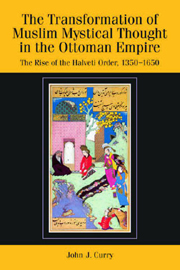 The Transformation of Muslim Mystical Thought in the Ottoman Empire
The Transformation of Muslim Mystical Thought in the Ottoman Empire Book contents
- Frontmatter
- Contents
- List of Maps and Figures
- Abbreviations for Frequently Cited Works in the Text
- Acknowledgments
- Note on Transliteration
- Map 1
- Map 2
- INTRODUCTION: ON THE STUDY OF OTTOMAN MYSTICAL TRADITIONS
- PART I THE RISE AND SPREAD OF THE HALVETİ ORDER FROM ITS ORIGINS THROUGH THE ELEVENTH/SEVENTEENTH CENTURY
- PART II THE EVOLUTION OF A HALVETİ SUB-BRANCH: THE LIFE AND CAREER OF ŞAcBÂN-I VELİ AND HIS FOLLOWERS IN THE KASTAMONU REGION
- PART III DEFENDING THE CULT OF SAINTS IN ELEVENTH/SEVENTEENTH-CENTURY KASTAMONU: TRANSFORMING THE ŞAcBÂNİYE ORDER UNDER cÖMER EL-FUɔÂDÎ
- CONCLUSION: WHAT CAN THE ŞAcBÂNİYE TEACH US ABOUT TRANSITIONS IN THE EARLY MODERN PERIOD OF WORLD HISTORY?
- Appendix I
- Appendix II
- Works Cited and Further Reading
- Index of Persons
- Index of Places
- Index of Subjects
INTRODUCTION: ON THE STUDY OF OTTOMAN MYSTICAL TRADITIONS
Published online by Cambridge University Press: 12 September 2012
- Frontmatter
- Contents
- List of Maps and Figures
- Abbreviations for Frequently Cited Works in the Text
- Acknowledgments
- Note on Transliteration
- Map 1
- Map 2
- INTRODUCTION: ON THE STUDY OF OTTOMAN MYSTICAL TRADITIONS
- PART I THE RISE AND SPREAD OF THE HALVETİ ORDER FROM ITS ORIGINS THROUGH THE ELEVENTH/SEVENTEENTH CENTURY
- PART II THE EVOLUTION OF A HALVETİ SUB-BRANCH: THE LIFE AND CAREER OF ŞAcBÂN-I VELİ AND HIS FOLLOWERS IN THE KASTAMONU REGION
- PART III DEFENDING THE CULT OF SAINTS IN ELEVENTH/SEVENTEENTH-CENTURY KASTAMONU: TRANSFORMING THE ŞAcBÂNİYE ORDER UNDER cÖMER EL-FUɔÂDÎ
- CONCLUSION: WHAT CAN THE ŞAcBÂNİYE TEACH US ABOUT TRANSITIONS IN THE EARLY MODERN PERIOD OF WORLD HISTORY?
- Appendix I
- Appendix II
- Works Cited and Further Reading
- Index of Persons
- Index of Places
- Index of Subjects
Summary
In studying the Ottoman Empire, many scholars have focused heavily on the social, economic, and political history of its various regions, while neglecting the field of religious and cultural history. Specialists in the field, regardless of nationality or ideology, have regarded the Ottoman period as one of cultural and intellectual stagnation, especially in its later years. Recently, however, scholars have begun to rethink their perceptions about the Ottomans and assess more objectively their important contributions to the religious, intellectual, and cultural life of their time. Nevertheless, a lack of critical studies on this aspect of the Ottoman legacy has hampered attempts to present a coherent picture of the Empire's history.
The majority of the past six decades of scholarship has targeted political and economic history, seeking to explain the trajectory of the Ottoman enterprise within the realm of secular phenomena. However, it is becoming increasingly clear that this economic and political history cannot, and should not, be completely separated from its religio-cultural background. Studies tackling religious and cultural topics indicate that both intellectual production and everyday religious activity among Ottomans enjoyed an extraordinary dynamism. In addition, political and economic crises during the Empire's history often went hand-in-hand with spiritual crises that were equally influential in shaping the course of events. This is often obscured by studies of modern mysticism: for example, in a study of mystics in Egypt during the 1980s, Valerie Hoffman noted the generally apolitical form which their mystical expression took. She concluded that the political power of mystical orders during Ottoman times thus represented an anomaly rather than the norm.
- Type
- Chapter
- Information
- The Transformation of Muslim Mystical Thought in the Ottoman EmpireThe Rise of the Halveti Order, 1350–1650, pp. 1 - 12Publisher: Edinburgh University PressPrint publication year: 2010


